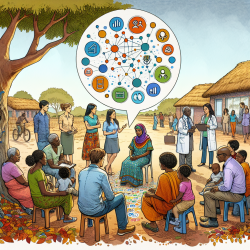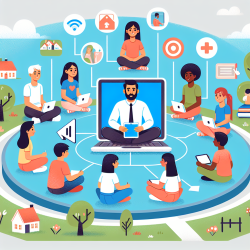Introduction
As a speech-language pathologist, your role extends beyond individual therapy sessions to include engaging with communities to foster environments that support child development. The study titled "The role of community conversations in facilitating local HIV competence: case study from rural Zimbabwe" provides insights that can be applied to improve outcomes for children in educational settings. This blog will explore how the findings of this study can be leveraged to enhance your practice.
Understanding Community Conversations
Community conversations are structured dialogues facilitated by trained individuals, aimed at identifying local strengths and challenges and developing action plans. In the context of rural Zimbabwe, these conversations were instrumental in enhancing local HIV competence by encouraging openness, reducing stigma, and promoting community-driven solutions.
Applying Findings to Speech-Language Pathology
While the study focused on HIV competence, the principles of community conversations can be adapted to the field of speech-language pathology to create supportive environments for children. Here are some ways to implement these findings:
- Facilitate Open Dialogue: Create spaces where educators, parents, and community members can discuss challenges and strengths related to child development and speech-language issues.
- Develop Action Plans: Work collaboratively with stakeholders to brainstorm and implement strategies that address specific needs, such as increasing awareness of speech disorders and promoting early intervention.
- Reduce Stigma: Use conversations to challenge misconceptions about speech and language disorders, fostering a more inclusive and supportive environment for children.
- Encourage Community Involvement: Engage community members as active participants in supporting children's communication needs, similar to how community members in Zimbabwe supported HIV initiatives.
Encouraging Further Research
The study highlights the importance of understanding local contexts and involving communities in the problem-solving process. As practitioners, it's crucial to continuously seek out research and data that inform and enhance your practice. Consider conducting your own community conversations to gather insights and develop tailored interventions for your specific setting.
Conclusion
Community conversations offer a powerful tool for speech-language pathologists to engage with communities and improve outcomes for children. By fostering open dialogue, developing actionable plans, and reducing stigma, you can create environments that support child development and communication. To delve deeper into the original research, please follow this link: The role of community conversations in facilitating local HIV competence: case study from rural Zimbabwe.










